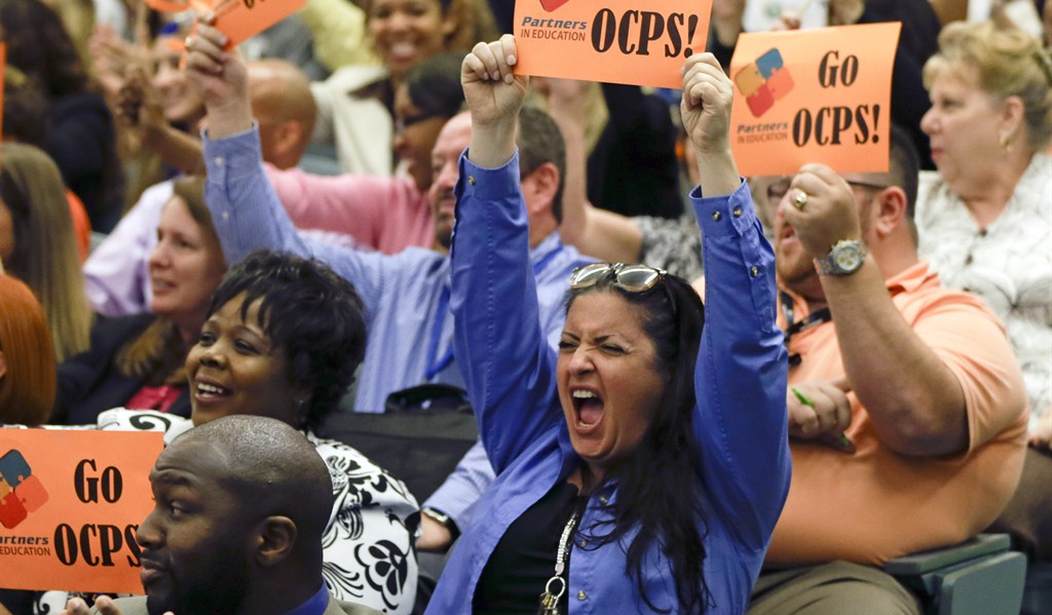Florida teachers are being told to make their classroom libraries — and any other books that haven’t been approved by the state — inaccessible to students.
The policy was put into place last week in response to HB 1467, which Gov. Ron DeSantis (R-Fla.) signed into law last March. That law established that teachers could not pick books that they say are appropriate for their students based on their own idea of what’s “appropriate.”
The teachers are complaining that the state doesn’t trust them to choose only approved literature. And they’re right.
And that’s a good thing.
I’m pretty much a free-speech absolutist. But I draw a line when it comes to choosing reading material for children that deals with non-age-appropriate subject matter like sex, gender questions, sex preferences, and other obvious adult topics.
Related: Gov. Ron DeSantis Lowers the *BOOM* on Florida Teachers’ Unions
When HB 1467 was being debated, a drama was playing out in Duval County that demonstrated why teachers can’t be trusted.
After multiple records requests asking the district to provide the names of these “essential” books, the district provided the information some eight months later. The district relented after two attorneys got involved and after legislation from Tallahassee shined a spotlight on a community’s basic right to know what materials our public schools are making available to students.
When Moms for Liberty Duval finally received the records dump, mining through the information proved to be an exercise in discovery that validated the concerns of many. We learned that the district chose to purchase pre-packaged book collections for every K-5 ELA classroom before reviewing any of them.
First, the district stonewalled a totally valid request for information. And then the “pre-packaged book collections’ purchased for every elementary classroom in the district proved to be questionable.
DCPS purchased a book called Stonewall Riots for elementary classroom libraries. A district employee who reviewed this book wrote, “There are hundreds of men having orgies in a used meat locker that smelled of dead remains and they were all in there at once having sex.” Further on, the reviewer states the book, “rationalized prostitution and drugs,” and referred to police as “pigs.” Additionally, the book includes “bar scenes, throwing shot glasses, drugs and alcohol throughout.” As her final statement in the book review, the reviewer wrote, “These were sent to elementary schools. I can’t imagine them being in school at all. [This book] has no place in school.”
DCPS purchased a book called Gracefully Grayson for elementary classroom libraries. A district employee who reviewed this book indicated it “graphically depicted person on person violent acts,” “includes some sexual acts or dirty jokes,” “allusions to sexual acts,” “many instances of racial, religious, gendered slurs.” The reviewer comments, “I would not recommend this for a regular classroom independent reading in elementary school. This type of book deals highly with death and dying…from the perspective of someone whose fixation is on the focus of the person they lost and is dealing with psychological issues as a result of feeling alone.”
Almost 48% of the reviews by the district “deemed material inappropriate for the intended audience, as assessed by instructional materials specialists — not radical, right-wing “book banners,” say Moms for Liberty. In Florida, all reading material, whether in a library or classroom, must be vetted “by a school district employee who holds a valid educational media specialist certificate, regardless of whether the book is purchased, donated, or otherwise made available to students,” according to the text of the law. And 48% of those school district employees found the materials placed in classrooms to be “inappropriate.”
So yes, Florida teachers cannot be trusted. Nor can the school district. The curricula wars have become necessary because school boards have bypassed their natural partners in educating children: the parents. And until they stop trying to hide their radicalism and do it by appealing to their authority, parents should continue to question the motives and choices of schools.










Join the conversation as a VIP Member